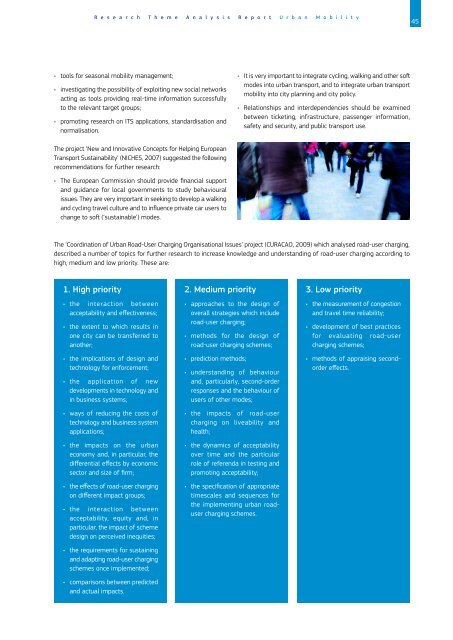Research Theme Analysis Report Urban Mobility
TRIP_Urban_Mobility_brochure-12.04.2016.pdf?utm_content=buffer91143&utm_medium=social&utm_source=twitter
TRIP_Urban_Mobility_brochure-12.04.2016.pdf?utm_content=buffer91143&utm_medium=social&utm_source=twitter
Create successful ePaper yourself
Turn your PDF publications into a flip-book with our unique Google optimized e-Paper software.
R e s e a r c h T h e m e A n a l y s i s R e p o r t U r b a n M o b i l i t y<br />
45<br />
• tools for seasonal mobility management;<br />
• investigating the possibility of exploiting new social networks<br />
acting as tools providing real-time information successfully<br />
to the relevant target groups;<br />
• promoting research on ITS applications, standardisation and<br />
normalisation.<br />
• It is very important to integrate cycling, walking and other soft<br />
modes into urban transport, and to integrate urban transport<br />
mobility into city planning and city policy.<br />
• Relationships and interdependencies should be examined<br />
between ticketing, infrastructure, passenger information,<br />
safety and security, and public transport use.<br />
The project ‘New and Innovative Concepts for Helping European<br />
Transport Sustainability’ (NICHES, 2007) suggested the following<br />
recommendations for further research:<br />
• The European Commission should provide financial support<br />
and guidance for local governments to study behavioural<br />
issues. They are very important in seeking to develop a walking<br />
and cycling travel culture and to influence private car users to<br />
change to soft (‘sustainable’) modes.<br />
The ‘Coordination of <strong>Urban</strong> Road-User Charging Organisational Issues’ project (CURACAO, 2009) which analysed road-user charging,<br />
described a number of topics for further research to increase knowledge and understanding of road-user charging according to<br />
high, medium and low priority. These are:<br />
1. High priority<br />
• the interaction between<br />
acceptability and effectiveness;<br />
• the extent to which results in<br />
one city can be transferred to<br />
another;<br />
• the implications of design and<br />
technology for enforcement;<br />
• the application of new<br />
developments in technology and<br />
in business systems;<br />
• ways of reducing the costs of<br />
technology and business system<br />
applications;<br />
• the impacts on the urban<br />
economy and, in particular, the<br />
differential effects by economic<br />
sector and size of firm;<br />
• the effects of road-user charging<br />
on different impact groups;<br />
• the interaction between<br />
acceptability, equity and, in<br />
particular, the impact of scheme<br />
design on perceived inequities;<br />
• the requirements for sustaining<br />
and adapting road-user charging<br />
schemes once implemented;<br />
• comparisons between predicted<br />
and actual impacts.<br />
2. Medium priority<br />
• approaches to the design of<br />
overall strategies which include<br />
road-user charging;<br />
• methods for the design of<br />
road-user charging schemes;<br />
• prediction methods;<br />
• understanding of behaviour<br />
and, particularly, second-order<br />
responses and the behaviour of<br />
users of other modes;<br />
• the impacts of road-user<br />
charging on liveability and<br />
health;<br />
• the dynamics of acceptability<br />
over time and the particular<br />
role of referenda in testing and<br />
promoting acceptability;<br />
• the specification of appropriate<br />
timescales and sequences for<br />
the implementing urban roaduser<br />
charging schemes.<br />
3. Low priority<br />
• the measurement of congestion<br />
and travel time reliability;<br />
• development of best practices<br />
for evaluating road-user<br />
charging schemes;<br />
• methods of appraising secondorder<br />
effects.


